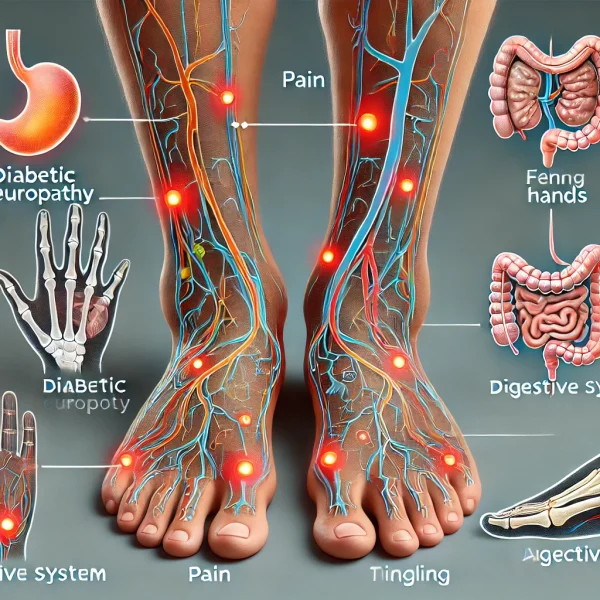Diabetic Neuropathy Symptoms
Diabetic Neuropathy Symptoms in Kumbakonam: A Comprehensive Guide

Introduction
Living with diabetes requires constant management and awareness of potential complications. One such complication is diabetic neuropathy, a condition that affects the nerves and can lead to significant discomfort and health issues. Understanding its symptoms is crucial for timely intervention and management.

Understanding Diabetic Neuropathy
What Is Diabetic Neuropathy?
Diabetic neuropathy is a type of nerve damage that occurs due to prolonged high blood sugar levels. This condition can impact various parts of the body, with symptoms ranging from mild to severe. The nerves in the legs and feet are most commonly affected, but it can also damage nerves in the digestive system, urinary tract, blood vessels, and heart.
Common Symptoms of Diabetic Neuropathy
Numbness and Tingling: Many individuals experience a loss of sensation or a tingling feeling, particularly in the extremities such as feet and hands.
Pain and Burning Sensations: Sharp, jabbing pain or a burning sensation is a frequent symptom, often worsening at night.
Muscle Weakness: Nerve damage can lead to muscle weakness, affecting mobility and coordination.
Sensitivity to Touch: Increased sensitivity to touch can make even the lightest contact painful.
Digestive Issues: Neuropathy affecting the digestive system may cause nausea, vomiting, diarrhea, or constipation.
Dizziness and Balance Problems: Nerve damage affecting blood pressure can lead to dizziness and balance issues, increasing the risk of falls.
Urinary Problems: Difficulty emptying the bladder completely or incontinence can occur due to nerve damage affecting the urinary tract.
Managing Diabetic Neuropathy
Immediate Treatments
If you suspect you have symptoms of diabetic neuropathy, it is essential to seek medical advice promptly. Here are some immediate steps you can take:
Maintain Blood Sugar Levels: Keeping blood sugar levels within the target range can prevent further nerve damage.
Pain Management: Over-the-counter pain relievers, prescribed medications, or topical treatments can help manage pain.
Long-Term Management
Effective long-term management of diabetic neuropathy involves a combination of medical treatment and lifestyle adjustments:
Regular Monitoring: Routine check-ups with your healthcare provider to monitor your condition and adjust treatment plans as necessary.
Healthy Diet and Exercise: A balanced diet and regular physical activity can improve blood sugar control and overall health.
Foot Care: Proper foot care, including regular inspections and wearing comfortable shoes, is crucial to prevent complications.
Personalized Care in Kumbakonam
At our clinic in Kumbakonam, we offer comprehensive care for diabetic neuropathy. Our approach includes:
Thorough Assessment
Our healthcare professionals conduct detailed assessments to understand the extent of nerve damage and its impact on your health. This includes nerve conduction studies and physical examinations.
Customized Treatment Plans
Based on the assessment, we create personalized treatment plans that address your specific needs. These plans may include medication management, physical therapy, and dietary recommendations.
Continuous Support
We provide ongoing support to help you manage your condition effectively. Regular follow-ups and consultations ensure that your treatment plan is working and any necessary adjustments are made promptly.

Conclusion
Managing diabetic neuropathy is crucial for maintaining your quality of life. Recognizing the symptoms and seeking timely medical care can make a significant difference. Our clinic in Kumbakonam is dedicated to providing specialized care and support for individuals dealing with diabetic neuropathy, helping you achieve better health outcomes.
F.A.Q

Diabetic neuropathy is a type of nerve damage that occurs in people with diabetes. It can affect various parts of the body, most commonly the nerves in the legs and feet.
Diabetic neuropathy is caused by prolonged high blood sugar levels, which can damage nerves over time. Other factors, such as high cholesterol, high blood pressure, and smoking, can also contribute to nerve damage.
- Numbness and tingling: Especially in the hands and feet.
- Pain and burning sensations: Sharp, jabbing pains or burning sensations, often worse at night.
- Muscle weakness: Leading to mobility and coordination issues.
- Increased sensitivity to touch: Even light touch can cause pain.
- Digestive problems: Nausea, vomiting, diarrhea, or constipation.
- Dizziness and balance issues: Particularly when standing up quickly.
- Urinary problems: Difficulty emptying the bladder completely or incontinence.
Diabetic neuropathy is diagnosed through a combination of medical history, physical examination, and specific tests such as nerve conduction studies and electromyography (EMG) to assess nerve function.
While nerve damage from diabetic neuropathy cannot usually be reversed, proper management of blood sugar levels and other treatments can help manage symptoms and prevent further damage.
- Medications: To manage pain and other symptoms.
- Physical therapy: To improve strength and mobility.
- Lifestyle changes: Such as maintaining a healthy diet, regular exercise, and proper foot care.
- Alternative therapies: Such as acupuncture or biofeedback.
